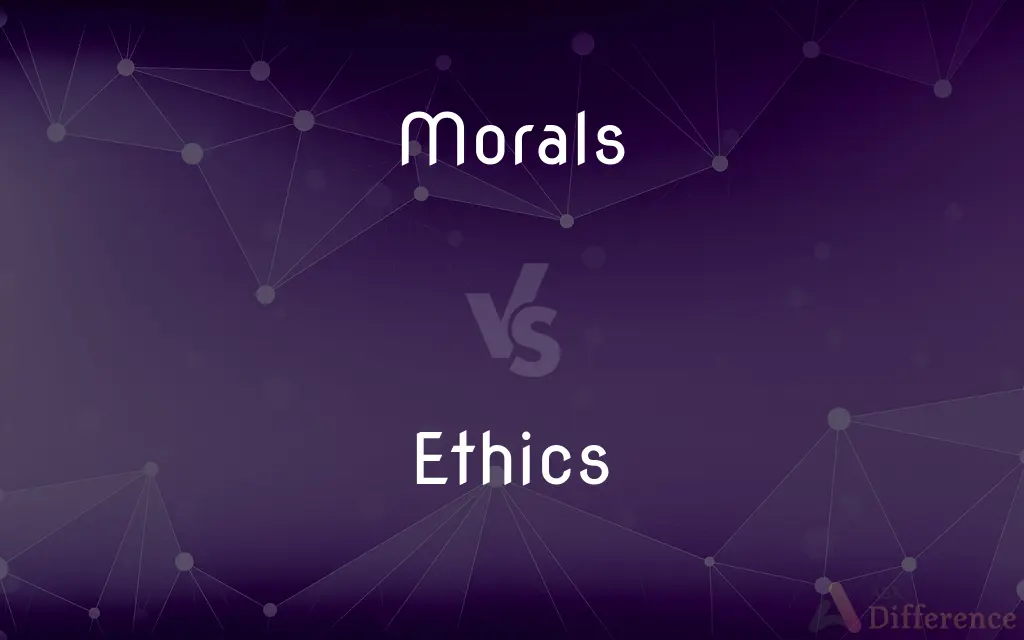Morals vs. Ethics — What's the Difference?
By Tayyaba Rehman — Updated on October 3, 2023
Morals are individual beliefs about right and wrong, while Ethics refers to the rules provided by an external source, usually a group or profession.

Difference Between Morals and Ethics
Table of Contents
ADVERTISEMENT
Key Differences
Morals and Ethics, though used interchangeably, have distinct meanings and implications. Morals pertain to beliefs concerning right and wrong behaviors, often derived from personal convictions or cultural teachings.
These beliefs are deeply internalized and tend to remain stable over time, guiding individual actions. Ethics, on the other hand, is more about the set of rules or guidelines that a group or profession agrees upon. They may be documented, ensuring members of the group maintain a certain standard of behavior.
While morals are intrinsic and often based on religious or cultural views, Ethics might be seen as a framework created to guide actions in a specific context, like a workplace. Importantly, an individual's morals might not always align with the ethical standards set by a group, leading to dilemmas.
For instance, someone's personal morals might disagree with the ethics of their profession. In such cases, the person must choose between personal convictions and professional obligations.
Comparison Chart
Source
Personal beliefs
Group or professional guidelines
ADVERTISEMENT
Nature
Internal, deeply held
Often external and formally documented
Foundation
Often based on cultural or religious teachings
Based on agreed-upon standards within a profession or group
Stability
Generally consistent throughout life
Can change based on group consensus
Application
Personal life decisions
Decisions in professional or group contexts
Compare with Definitions
Morals
Intrinsic values determining actions.
Children often learn morals from their parents.
Ethics
Framework ensuring consistency within a group.
Journalists adhere to ethics to maintain credibility.
Morals
Deeply held convictions guiding behavior.
His morals were influenced by his upbringing.
Ethics
Rules set by a group or profession.
Medical ethics prevent doctors from causing harm.
Morals
Personal beliefs about right and wrong.
Her strong morals prevented her from lying.
Ethics
Standards guiding behavior in specific contexts.
Business ethics focus on fair and transparent practices.
Morals
Individual standards of behavior.
Everyone's morals are shaped by their experiences.
Ethics
Often documented guidelines.
The company's code of ethics is available to all employees.
Morals
Principles based on cultural or religious teachings.
Some morals are shared across various cultures.
Ethics
Agreed-upon principles within a community.
Legal ethics are crucial in ensuring justice.
Morals
Of or concerned with the judgment of right or wrong of human action and character
Moral scrutiny.
A moral quandary.
Ethics
Ethics or moral philosophy is a branch of philosophy that "involves systematizing, defending, and recommending concepts of right and wrong behavior". The field of ethics, along with aesthetics, concerns matters of value; these fields comprise the branch of philosophy called axiology.Ethics seeks to resolve questions of human morality by defining concepts such as good and evil, right and wrong, virtue and vice, justice and crime.
Morals
Teaching or exhibiting goodness or correctness of character and behavior
A moral lesson.
Ethics
Moral principles that govern a person's behaviour or the conducting of an activity
A code of ethics
Medical ethics also enter into the question
Morals
Conforming to standards of what is right or just in behavior; virtuous
A moral life.
Ethics
The branch of knowledge that deals with moral principles
Neither metaphysics nor ethics is the home of religion
Morals
Arising from conscience or the sense of right and wrong
A moral obligation.
Ethics
A set of principles of right conduct.
Morals
Having psychological rather than physical or tangible effects
A moral victory.
Moral support.
Ethics
A theory or a system of moral values
"An ethic of service is at war with a craving for gain" (Gregg Easterbrook).
Morals
Based on strong likelihood or firm conviction, rather than on the actual evidence
A moral certainty.
Ethics
Ethics (used with a sing. verb) The study of the general nature of morals and of the specific moral choices to be made by a person; moral philosophy.
Morals
The lesson or principle contained in or taught by a fable, a story, or an event.
Ethics
Ethics (used with a sing. or pl. verb) The rules or standards governing the conduct of a person or the members of a profession
Medical ethics.
Morals
A concisely expressed precept or general truth; a maxim
Likes to follow the moral "To each, his own.".
Ethics
(philosophy) The study of principles relating to right and wrong conduct.
Morals
Morals Rules or habits of conduct, especially of sexual conduct, with reference to standards of right and wrong
A person of loose morals.
A decline in the public morals.
Ethics
Morality.
Morals
Plural of moral
Ethics
The standards that govern the conduct of a person, especially a member of a profession.
Morals
Motivation based on ideas of right and wrong.
Ethics
The science of human duty; the body of rules of duty drawn from this science; a particular system of principles and rules concerting duty, whether true or false; rules of practice in respect to a single class of human actions; as, political or social ethics; medical ethics.
The completeness and consistency of its morality is the peculiar praise of the ethics which the Bible has taught.
Morals
Motivation based on ideas of right and wrong
Ethics
Motivation based on ideas of right and wrong
Ethics
The philosophical study of moral values and rules
Common Curiosities
Are Ethics always written down?
Not always, but they often are, especially in professional settings.
Can someone's Morals conflict with Ethics?
Yes, personal morals can sometimes conflict with professional or group ethics.
Do Morals change over time?
Morals are generally stable, but can evolve based on personal experiences.
Is it possible for a practice to be ethical but not moral?
Yes, something might align with group ethics but conflict with an individual's morals.
Can you provide an example of Morals?
Not stealing because you believe it's wrong is based on morals.
Are Morals and Ethics the same?
No, morals are personal beliefs about right and wrong, while ethics are rules set by a group or profession.
Why are Ethics important in professions?
Ethics maintain standards, trust, and protect both professionals and the public.
Are Ethics universal?
No, ethics can vary between professions, groups, and cultures.
Can you provide an example of Ethics?
A doctor preserving patient confidentiality is adhering to medical ethics.
Can a person have good Morals but poor Ethics?
Yes, someone might have strong personal morals but not adhere to specific group or professional ethics.
Share Your Discovery

Previous Comparison
Siting vs. Sitting
Next Comparison
Define vs. DefinitionAuthor Spotlight
Written by
Tayyaba RehmanTayyaba Rehman is a distinguished writer, currently serving as a primary contributor to askdifference.com. As a researcher in semantics and etymology, Tayyaba's passion for the complexity of languages and their distinctions has found a perfect home on the platform. Tayyaba delves into the intricacies of language, distinguishing between commonly confused words and phrases, thereby providing clarity for readers worldwide.
















































